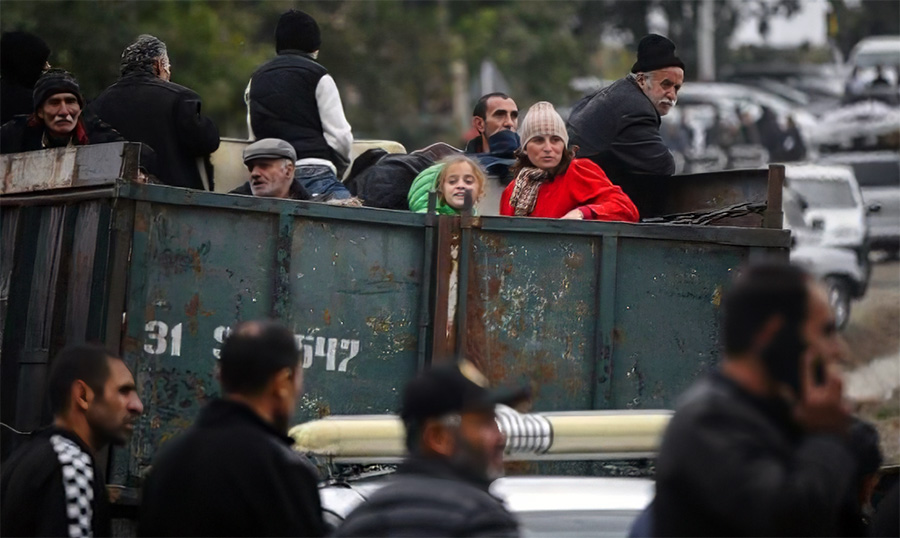The official Yerevan is silent on the issue of the right to return of the Artsakh residents, who have been forcibly displaced to Armenia as a result of the ethnic cleansing conducted by Azerbaijan in Nagorno-Karabakh in September 2023.
It is evident that Armenia’s foreign policy towards Artsakh should have changed in response to the new realities. Nevertheless, Armenian diplomacy had to develop and should continue to develop new talking points concerning the issue, both in its dialogue with Azerbaijan and on international platforms.
Regardless of the nature of agreements that were reached or discussed with mediators and Azerbaijan up until September 2023, remaining silent about the dispossession and the right of return of the Artsakh people is not only unacceptable but also dangerous. Notably, while official Yerevan remains silent, discussions on the topic are taking place in international forums and in the parliaments of Armenia’s partner countries.
Some arguments aimed at justifying this silence are being voiced. For instance, some argue that when we talk about the right to return of the Artsakh people, Baku counters with the concept of “Western Azerbaijan.” However, despite the fact that official Yerevan has not addressed the right of return of the Artsakh people at any level since September, Aliyev does not miss the chance to present territorial claims on Syuniq.
Another argument justifying the silence on the issue exists. It is often stated: “How do you imagine the return of the Artsakh people to the territories currently under Aliyev’s Azerbaijan control after this disaster and forced displacement?”. This “argument” is nothing more than a cheap moral stunt.
Those who stress the significance of the Artsakh people’s right of return are far from the delusion that our compatriots will be able to return to their homes tomorrow or in the near future. However, failing to address this right implies acceptance of the idea that these people willingly left their homeland. This is precisely what Ilham Aliyev claims.
Furthermore, the silence of Yerevan de facto nullifies the orders of the International Court of Justice (ICJ) regarding the more than nine-month illegal blockade of the Lachin corridor. It is worth mentioning that these orders have documented a direct threat to the lives of the Artsakh people.
It is worth noting that the International Court of Justice did not issue the order independently. The decision was made based on the official request of Armenia, indicating that at least until the end of 2023, the official Yerevan continued its policy of addressing the humanitarian issues of the Artsakh people at the state level.
The prevailing response of the political majority concerning the right of the Artsakh people to return in Armenian internal political discussions is as follows: “We are pursuing a peace agenda”. However, the specifics of this peace agenda remain largely undefined. Achieving peace requires, at the very least, a change in rhetoric so that parties can engage in meaningful dialogue, while Baku persists in military threats and territorial ambitions.
As a result of ethno-territorial conflicts, there are millions of refugees, forcibly displaced individuals, and internally and temporarily displaced people worldwide, including in our immediate neighborhood. At this moment, due to the Russian attack, millions of Ukrainians have found themselves in various European countries. The right of return for these people not only remains relevant, but many host states, such as Poland, have granted them the status of temporarily displaced persons.
Moving closer to our region, in the early 1990s, following the wars in Abkhazia and South Ossetia, neighboring Georgia received hundreds of thousands of refugees and internally displaced people. Subsequently, after the August 2008 war, diplomatic ties with Russia were severed.
Since then, Georgian diplomacy has seized every opportunity to address the issue of the right to return of forcibly displaced people, not only in peace negotiations with Russia but also in international forums. Meanwhile, Russia and Georgia continue to engage in trade and maintain regular flights, with the number of Russian tourists visiting Georgia steadily growing.
The refusal of Official Yerevan to address the issue of the right of return of Artsakh Armenians, or attempts to remove this issue from the agenda, is at the very least unnatural and may even be considered absurd.
The Armenians of Artsakh, who were on the verge of annihilation after the 2020 war, suffered the biggest losses of this conflict. Therefore, if peace is to be established between Armenia and Azerbaijan at any point, the rights of this segment of our population should be addressed.
Even if in the near future it will be possible to achieve the logic of “no war, no peace”, as is the case of Georgia and Russia, the fact of the dispossession of Artsakh citizens and their right to return cannot be simply forgotten.
Let’s consider setting aside the moral and emotional dimensions of the issue. Even if Nikol Pashinyan and his political majority have decided that the Republic of Armenia will not be responsible for the rights of Artsakh Armenians during their rule, hoping to achieve peace with Azerbaijan in this manner, other states may step in, using it as leverage against Azerbaijan.
Just as the issue of recognition of the Armenian Genocide was once taken aside from the scope of Armenian-Turkish relations, becoming a leveraging tool in the hands of third countries against Turkey, which, at the very least, did not contribute to the normalization of Armenian-Turkish relations.
to be continued
Arsen Kharatyan
